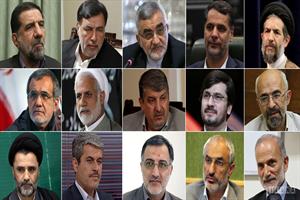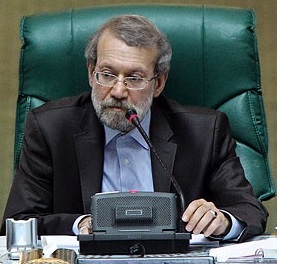On August 19, Iran’s parliament selected 15 members for a panel that will review the nuclear deal between Iran and the world’s six major powers. Two dozen law makers volunteered to serve on the panel; 15 were then elected by the full parliament. The group includes 13 conservatives.

In an interview with Alef news, Foreign Minister Mohammad Javad Zarif said that the nuclear deal is not a treaty, and therefore does not require Parliament’s ratification. “As a person who has taught law for quite some time, I have to tell you that the JCPOA [Joint Comprehensive Plan of Action] is, in fact, under the management and supervision of the U.N. Security Council’s resolutions, which has nullified the previous resolutions,” he said in the interview, which was published on August 21.
Another senior member of the negotiating team, Deputy Foreign Minister Majid Takht Ravanchi, also does not see a need for ratification. “The JCPOA’s nature is not like a protocol or an international treaty. The other parties [to the deal], namely the six countries that negotiated with Iran, are not going to ratify it. Thus, there is no need for its ratification by the parliament,” he said on August 26.
In September, Iran's top nuclear official, Ali Akbar Salehi, announced that International Atomic Energy Agency chief Yukiya Amano would visit Iran. Shortly after, the chairman of the parliamentary commission, Ali Reza Zakani, asked Zarif in a letter to invite Amano to parliament to answer lawmakers’ questions.
On August 16, a petition signed by 201 out of 290 members of parliament called on the government to formally submit the deal for review. The following is a translation of the petition, as published by Entekhab News and translated by Iran Front Page, along with key remarks by the 15 lawmakers on the review panel.
Petition Signed by 201 Lawmakers
In line with our legal obligations, we, the deputies of the Islamic Consultative Assembly, who have signed this petition announce that:
1. We thank the nuclear negotiating team for its tireless efforts in the course of the talks.
2. Under Articles 77 and 125 of the Constitution, the review of the Joint Comprehensive Plan of Action falls under the purview of the Islamic Consultative Assembly and requires cooperation from all relevant institutions.
3. The executive branch should immediately present the Joint Comprehensive Plan of Action in the form of a bill.
4. Any voluntary measures and implementation of the deal – be it temporary, permanent or conditional – would be illegal before the approval of the Islamic Consultative Assembly and subsequent confirmation of the Guardian Council.
200-plus MPs call on government to present #JCPOA bill http://t.co/O95zQTNSMZ #IranDeal #parliament pic.twitter.com/Pb7HsgmoR1
— Iran Front Page (@IranFrontPage) August 16, 2015Members of the 15-member panel to review the deal
Alaeddin Boroujerdi (Tehran), National Security and Foreign Policy Committee Chairman
“We are still distrustful of the United States because of the country’s arrogant nature and its support for the Zionist regime [Israel] in the massacre of the oppressed people of Palestine and its move to back Saudi Arabia’s killing of the Yemeni people. In this climate of mistrust, there are concerns and if they renege [on the nuclear agreement], we will do the same.”
—Aug. 9, 2015 to al Alam TV via Tasnim News Agency
Ibrahim Karkhaneh (Hamedan)
“The limitations [imposed on Iran] go beyond the NPT [Nuclear Non-Proliferation Treaty].”
—Aug. 1, 2015 according to Fars New Agency
Ismail Kowsari (Tehran), National Security and Foreign Policy Committee member
“The JCPOA [the final nuclear deal or Joint Comprehensive Plan of Action] is an international treaty. Therefore, Parliament must ratify it.”
—Aug. 2, 2015 in remarks via the Islamic Consultative Assembly News Agency
Hossein Naghavi Hosseini (Varamin), National Security and Foreign Policy Committee member
“Ever since news about a confidential agreement between Iran and the IAEA was made public, US lawmakers have been seeking to learn about its content.”
“What is surprising is that Amano, who is the director general of an independent international agency, and not a US government secretary, is summoned to the US Senate and he accepts to show up.”
—Aug. 2, 2015 according to Fars News Agency via Iran Front Page
Hossein Nejabat (Tehran)
“We will not allow any intrusion to our defense and military installations.”
“There are points of contention in the agreement.”
—July 26, 2015 via Tasnim News
Alireza Zakani (Tehran), Chairman of the JCPOA Committee
“The Administration’s only option is to send the JCPOA as a bill.”
—Aug. 19, 2015 in an interview with Tasnim News Agency
Mohammad Hassan Aboutorabi-Fard (Tehran), First Vice-Speaker
Vahid Ahmadi (Kangavar)
Mansour Arani (Aran and Bigdel)
Mehrdad Bazrpash (Tehran)
Mansour Haghighatpour (Ardebil)
Seyyed Mahmoud Nabavian (Tehran)
Masoud Pezeshkian (Tabriz)
Gholamreza Tajgardoun (Gachsaran)
Mohammad Mehdi Zahedi (Kerman)
Other lawmakers
Parliamentary Speaker Ali Larijani
 “We should understand that the current situation is a new era; the negotiations should not be scaled down to merely facile verbal give and take and without difficulty; this has been one of the most difficult negotiations in the history of Revolution; talks had been in constant frequenting between negotiation venue and Tehran to be discussed by authorities and get rechanneled into another module, and it was a two-way street.”
“We should understand that the current situation is a new era; the negotiations should not be scaled down to merely facile verbal give and take and without difficulty; this has been one of the most difficult negotiations in the history of Revolution; talks had been in constant frequenting between negotiation venue and Tehran to be discussed by authorities and get rechanneled into another module, and it was a two-way street.”“What appears on paper reflects only one side of the difficulties inherent in the negotiations. The deal is the end of a period; however, it is the onset of an eventful era; it should not be assumed that the path after the deal will be without its own difficulties; current propaganda raised about Parchin is quite superficial, aiming at wielding impact on international decision-making, and a solution to domestic concerns inside the United States.”
“We should be aware that the post-deal era is a new untrodden path with new challenges; we should understand well the JCPOA document, and act out of honesty and good faith in explaining its provisions.”
“This is definitely a trade-off, and no one would claim a maximal gain for Iran in the JCPOA; however, the major issues of concern for Iran had been well-balanced vis-à-vis the Western demands, which is first to retain the enrichment right and second removal of sanctions, which will not be without its own consequences.”
—Aug. 8, 2015 in an address to Parliament’s Joint Budget Commission as reported by Khorosan
The nuclear deal is a “national achievement” that should lead to growth in production and prosperity in the cultural, defense and science fields.
—July 23, 2015 according to IRIB News
Photo credit: JCPOA committee members via Islamic Parliament of Iran website, Ali Larijani via ICANA and Islamic Parliament of Iran website,
